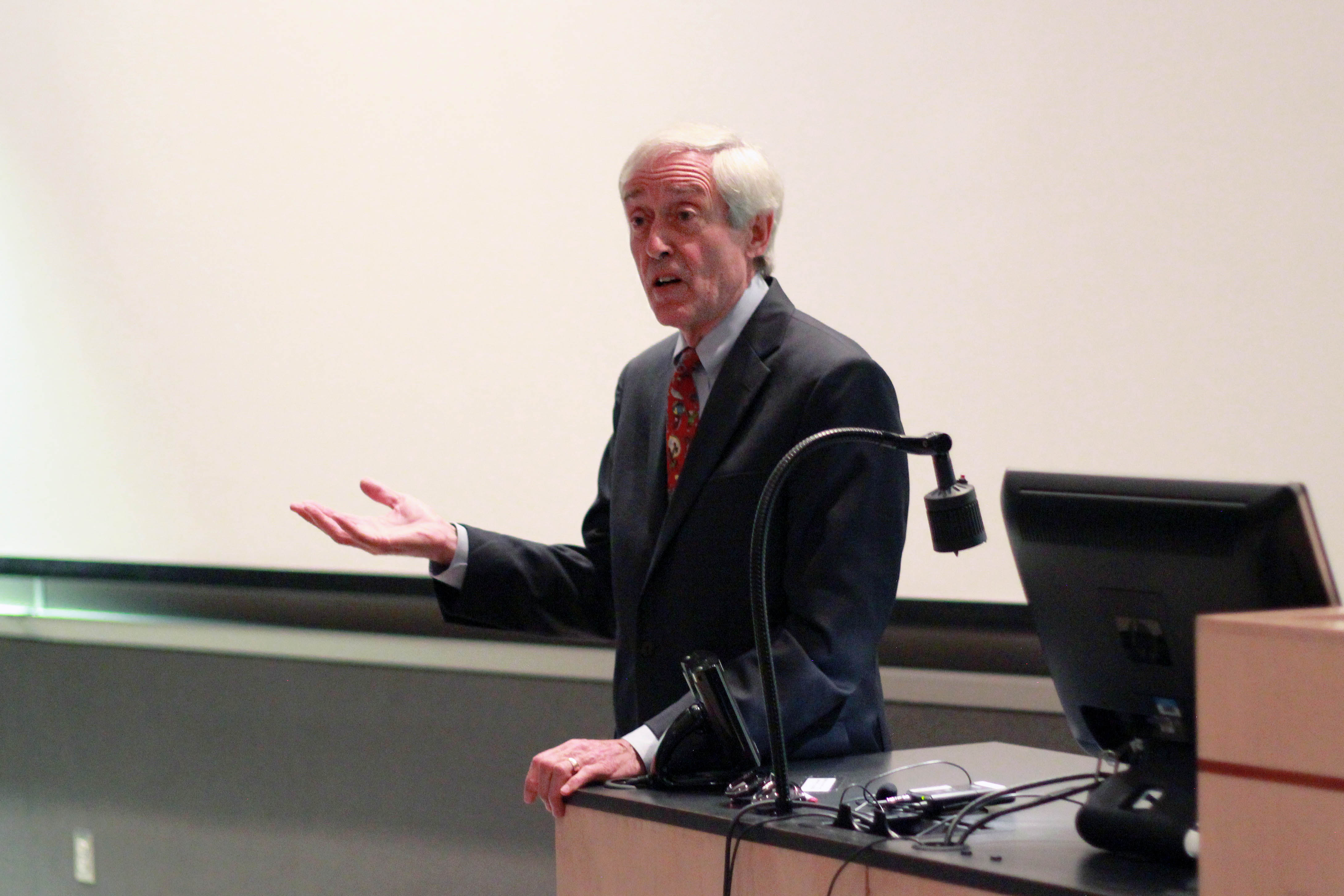Scarff Professor of International Affair George Rupp gave his talk on Tuesday.
Photo by Luke Payne
Last Tuesday, May 10, Visiting Scarff Professor of International Studies George Rupp, Ph.D., spoke about the characteristics of inclusive communities worldwide in the Wriston Auditorium. Rupp had formerly served as the President of Rice University and then Columbia University, as well as a dean and professor of divinity at the Harvard School of Divinity.
He received his Bachelor’s degree in Divinity from Yale University, and a Ph.D. in Religion from Harvard.
Currently, he serves as a Fellow at the Carnegie Council for Ethics and International Affairs, Chair at the International Baccalaureate Organization, and Distinguished Visiting Professor at the Institute for Religion, Culture and Public Affairs at Columbia University.
Despite his engagement with various universities, Rupp came to talk at Lawrence primarily as a formerer member of the International Rescue Committee (IRC). IRC is a humanitarian organization that devotes its efforts to working with refugees and displaced persons in more than 24 countries.
Having served as the committee’s president from 2012 to 2013 and being the author of six publications that focus on building more inclusive and cooperative communities, Rupp took the floor to discuss the makings of culturally robust communities today. At the beginning of his speech, Rupp summarized the core of his argument with the following thesis: “Modern Western individualism must engage with, rather than simply reject, the myriad ways that societies worldwide embrace core convictions as grounded in particular communities.”
Throughout the speech, Rupp encouraged “open” forms of thinking, in which both individualism and a sense of communal servitude can exist side by side. “Individualism, as it has evolved in the West,” he conveyed, “may appear powerful and attractive. Yet, it unavoidably encounters concerted opposition from the deeply rooted patterns that it disrupts, and in effect, would overturn.”
At the end of the speech, during a short discussion session that was held in order to ask Rupp questions on his speech, he stressed the importance of university communities in upholding standards for inclusive communities worldwide. “I think colleges and universities, and in particular liberal arts universities, have a terrifically important role to play in developing the needed mindset,” shared Rupp.
“They have the immense task of educating students on their own traditions as well as those of others, which are both vital in enhancing passionate conviction and consequently bringing about an inclusive community.”
“Rupp simply mesmerized his audience by talking about the importance of acceptance, diversity and service,” shared junior government major Regina Cornish. “He is an amazing individual who has had the opportunity to influence thousands of people’s lives.”
“His work with IRC and academic institutions has made him a well-rounded individual that is driven to help make other people’s lives better,” she added. “and on top of that, he is intrigued by Lawrence students in that he feels that we are eager to learn and give back.”
Senior and mathematics major Meghan Clark said, “His speech in Wriston was—as he stated in his own words, ‘abstract’—in that he talked about major concepts and then narrowed down to the ways that governments need to handle policy making, among other things. I was very glad I went to the talk and was honored to meet him.”
“What I appreciated most about Rupp’s talk was his attention to religion. My family is very religious, but we do not all follow the same religious teachings. The teachings that each member chooses to follow influences their actions and how they view the world,” Clark added, “so I thought it was really thoughtful of him to acknowledge how people are influenced by their religious teachings and how public policy should pay attention to religious preferences.”

